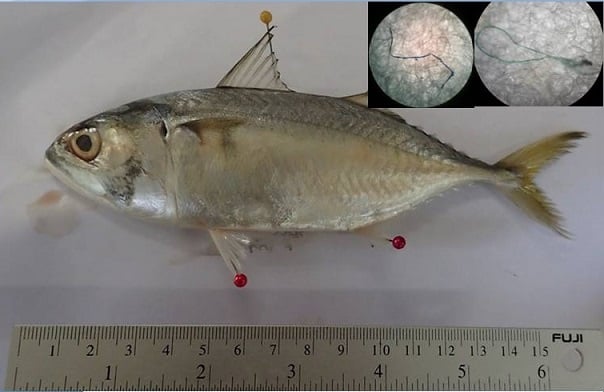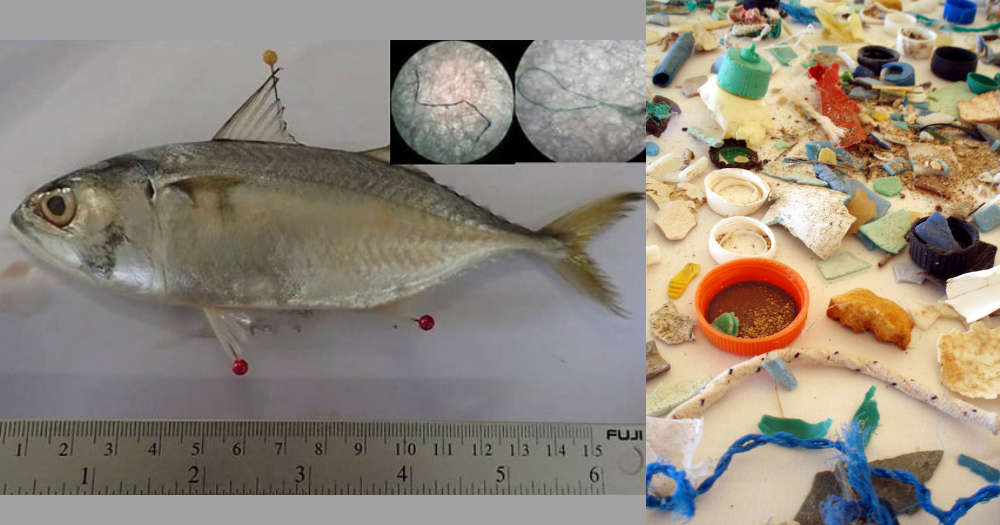The severity of the problem of marine plastic pollution is being highlighted again as researchers have found plastics inside fish caught off the coast of Southern Thailand.
Average of 78 pieces of microplastics in each fish
Researchers from the Marine National Park Operation Centre were originally conducting studies on marine pollution by collecting trash from the sea.
After realising that such trash might have adverse effect on the marine food chain, they decided to collect mackerel from local fishermen at the Hat Chao Mai National Park, Bangkok Post reported.
This area is home to many species of fish sold commercially.
The researchers then examined the stomachs of the fish, where they found an average of 78 pieces of microplastics, around one to five millimetres in width, in each fish.
 Photo from Marine National Park Operation Centre via The Nation / FB
Photo from Marine National Park Operation Centre via The Nation / FB
A total of 60 mackerel were collected over the course of several months, reported Thai media The Nation.
Following this discovery, the researchers plan to expand their study to other types of seafood in the Trang province, to assess the extent of the plastic pollution.
This includes other fishes and shellfish, as well as certain types of clams popular in the region.
Thai mackerel consumers appear unfazed
The study did not cover the physical impact of the microplastics on the fish, or the origin of the plastics.
However, it aimed to raise awareness on the negative impacts of marine trash, not just to marine life, but potentially to humans.
Researchers also hoped that it would encourage people to dispose of their trash properly.
Meanwhile, the Marine National Park Operation Centre has urged Thais to avoid panicking and shunning mackerel, according to The Straits Times.
Interviews with locals by The Nation, however, showed that the news did not appear to affect their appetite much.
A 37-year-old woman, Kornwan Thatchamongkol, said she was slightly wary after finding out about the microplastics as she and her family ate mackerel every week.
But she added that she would still continue to consume mackerel.
Mackerel seller Atchara Lomkhong also said that her daily sales had not been affected.
Both ladies urged people not to irresponsibly discard plastic waste into the sea and other water bodies.
Microplastics are everywhere
Microplastics found inside the guts of fish isn't a new issue.
But compared to videos and photos of turtles choking and whales dying from plastic bags, this problem has flown beneath the radar, mostly because of how small and insidious microplastics are.
Microplastics are plastics that have degraded over a long period of time to become tiny, invisible-to-the-naked-eye particles.
And fishes, such as the mackerel in Thailand, mistake the tiny pieces of plastic for food.
And these plastics exist not just in our seafood, but in plastic bottled water too.
Although scientists have yet to establish the effects of microplastics on the human body, because forcing a human subject to ingest such particles for science would be unethical research, the effects on marine life are undeniable.
Researchers have found that microplastics might leach hazardous chemicals, lead to inflammation and contribute to other effects such as liver damage, reported the Scientific American.
Fish exposed to these particles also reportedly reproduce less, and their offspring too -- this is despite their offspring not having been exposed to microplastics.
Top photo from Marine National Park Operation Centre via The Nation / FB and NOAA Marine Debris Program
If you like what you read, follow us on Facebook, Instagram, Twitter and Telegram to get the latest updates.
